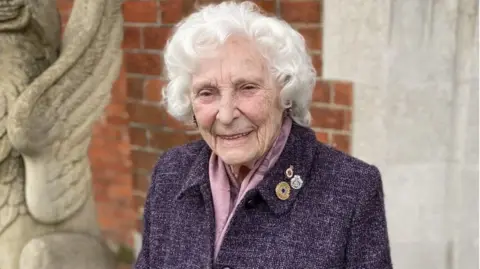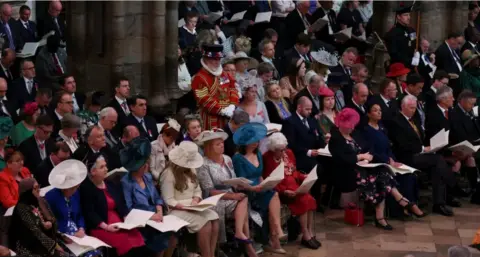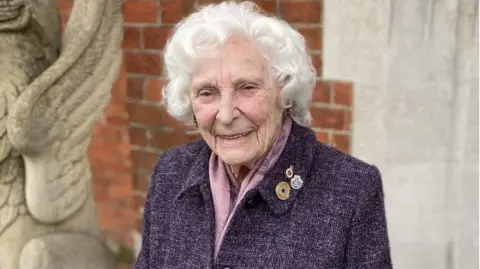BBC News, West Midlands
 BBC
BBCA decorated World War Two code breaker who spent her youth deciphering enemy messages at Bletchley Park has died at the age of 101.
Charlotte “Betty” Webb MBE – who was among the last surviving Bletchley code breakers – died on Monday night, the Women’s Royal Army Corps Association confirmed.
Mrs Webb, from Wythall in Worcestershire, joined operations at the Buckinghamshire base at the age of 18, later going on to help with Japanese codes at The Pentagon in the US. She was awarded France’s highest honour – the Légion d’Honneur – in 2021.
The Women’s Royal Army Corps Association described Mrs Webb as a woman who “inspired women in the Army for decades”.
Bletchley Park Trust CEO Iain Standen said Mrs Webb will not only be remembered for her work but “also for her efforts to ensure that the story of what she and her colleagues achieved is not forgotten.”
“Betty’s passion for preserving the history and legacy of Bletchley Park has undoubtedly inspired many people to engage with the story and visit the site,” he said in a statement.
Tributes to Mrs Webb have begun to be posted on social media, including one from historian and author Dr Tessa Dunlop who said she was with her in her final hours.
Describing Mrs Webb as “the very best”, she said on X: “She is one of the most remarkable woman I have ever known.”
Mrs Webb told the BBC in 2020 that she had “never heard of Bletchley”, Britain’s wartime code-breaking centre, before starting work there as a member of the ATS, the Auxiliary Territorial Service.
She had been studying at a college near Shrewsbury, Shropshire, when she volunteered as she said she and others on the course felt they “ought to be serving our country rather than just making sausage rolls”.
Her mother had taught her to speak German as a child and ahead of her posting remembered being “taken into the mansion [at Bletchley] to read the Official Secrets Act”.
“I realised that from then on there was no way that I was going to be able to tell even my parents where I was and what I was doing until 1975 [when restrictions were lifted],” she recalled.
She would tell the family with whom she lodged that she was a secretary.
When the War ended in Europe in May of 1945, she went to work at the Pentagon after spending four years at Bletchley, which with its analysis of German communications had served as a vital cog in the Allies’ war machine.
At the Pentagon she would paraphrase and transcribe already-decoded Japanese messages. She said she was the only member of the ATS to be sent to Washington, describing it as a “tremendous honour”.
Mrs Webb, in 2020, recalled she had had no idea the Americans planned to end the conflict by dropping atomic weapon on Japanese cities, describing the weapons’ power as “utterly awful”.
After the Allies’ final victory, it took Mrs Webb several months to organise return passage to the UK, where she worked as a secretary at a school in Shropshire.
The head teacher there had also worked at Bletchley so knew of her professionalism, whereas other would-be employers, she recalled, were left stumped by her being unable to explain – due to secrecy requirements – her previous duties.
More than half a century later, in 2021, Mrs Webb was one of 6,000 British citizens to receive the Légion d’Honneur, following a decision by President François Hollande in 2014 to recognise British veterans who helped liberate France.
 PA Media
PA MediaIn 2023, she and her niece were among 2,200 people from 203 countries invited to Westminster Abbey to see King Charles III’s coronation.
The same year she celebrated her 100th birthday at Bletchley Park with a party.
She and her guests were treated to a fly-past by a Lancaster bomber. She said at the time: “It was for me – it’s unbelievable isn’t it? Little me.”
Read full article at source
Stay informed about this story by subscribing to our regular Newsletter




